Full environmental impacts of spill remain to be seen in local beach cities
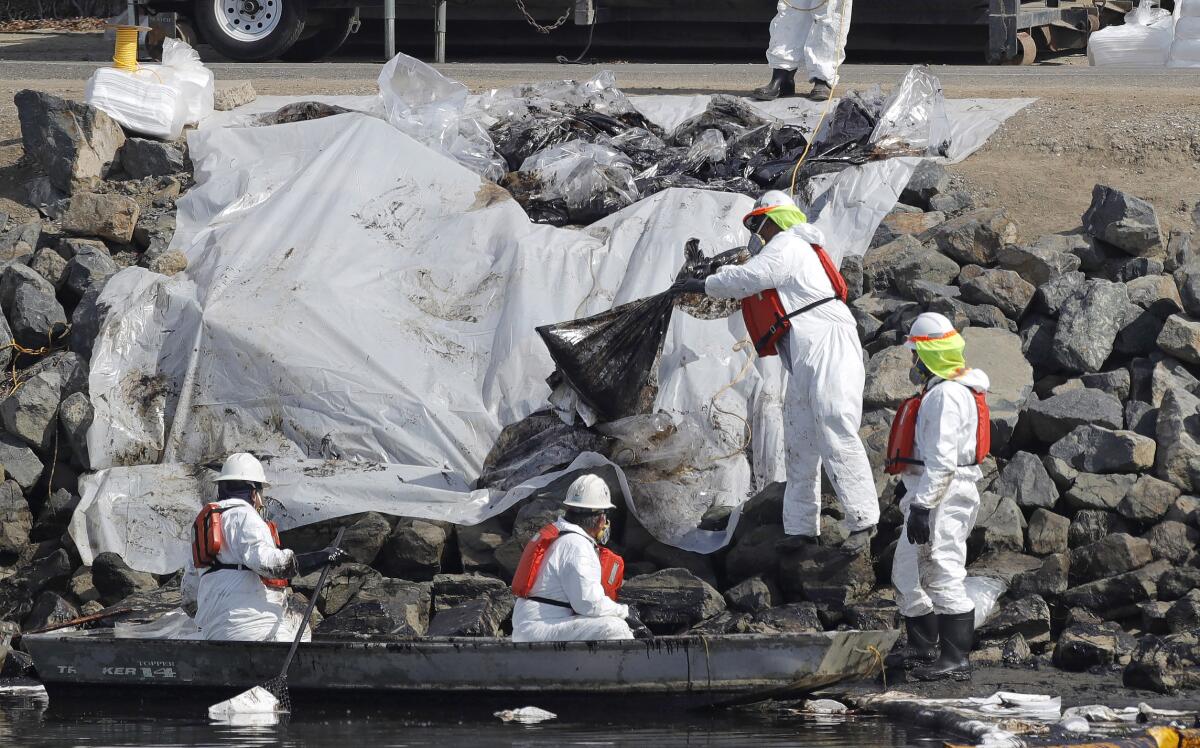
- Share via
Even as rescue workers rush to dab oil from the wings of compromised birds and execute carefully planned strategies for transporting species to and from care centers, environmentalists countywide are bracing for the full impact of an ecological disaster.
Local wildlife experts are reporting the initial tolls of an oil spill that broke out over the weekend near an offshore oil processing facility several miles at sea and began a slow but inevitable creep toward south Orange County coastlines, home to numerous protected areas and sensitive marshlands.
Following news of the spill Saturday, Huntington Beach city officials immediately moved to place floating containment booms to stop the encroachment of the spreading slick into delicate lands around Talbert Marsh and Bosa Chica Ecological Reserve.
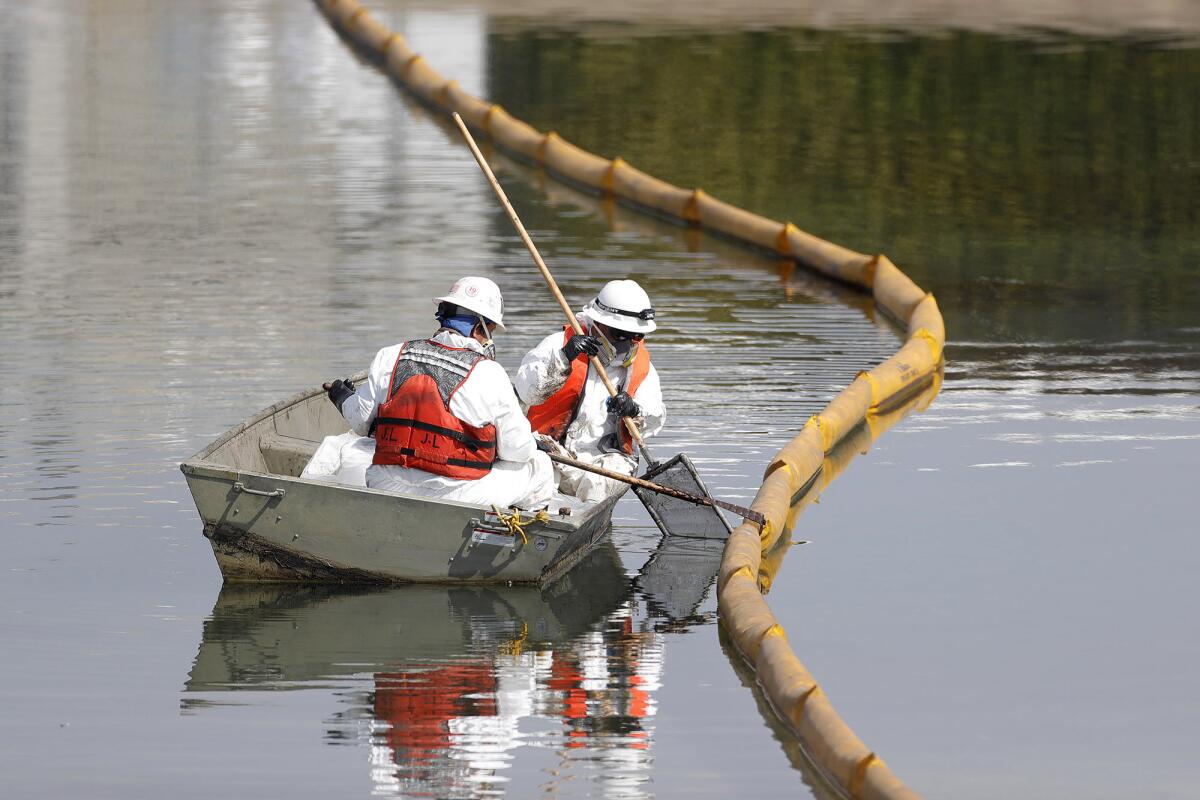
Cleanup crews have been busy at work in Newport and Laguna beaches, which absorbed the initial impact of the southward moving slick earlier this week.
By Monday, oil had infiltrated the Talbert, Brookhurst and Magnolia marshes, while initial efforts to keep Bolsa Chica intact seemed to have worked, said John Villa, executive director of the Huntington Beach Wetlands Conservancy.
“We’re pretty lucky, as far as how far the oil spill has gone west,” he said in a news conference. “It’s only gone just past the pier, and not very far. Bolsa Chica at least is protected from any oil getting there at this point. They have boomed off the inlet, so hopefully it will catch anything and move it away.”
Villa said the inlets to the marshes have been closed off, to stop any contaminated saltwater from coming in.
“That’s a critical balance we have to play with that,” he said. “Give it a week or two, the fish start dying off and the plants start dying off, because they need oxygen in the water.”
Anticipating ecological impacts immediately following the spill, representatives from California Fish & Wildlife and the Oiled Wildlife Care Network, in a joint news conference Monday at Huntington Beach’s Wetlands and Wildlife Care Center, updated the public on the procedure for transporting and treating animals impacted by the spill.

OWCN Director Michael Ziccardi said his team is searching on water and on land for oiled animals. As of Tuesday, a total of nine live oiled birds have been taken in, including a brown pelican that had to be euthanized Sunday due to chronic injuries.
Ziccardi said Monday he was “cautiously optimistic” about the relatively low number of impacted animals that had so far been collected.
“When we heard of the large size of the slick, we had great concerns,” Ziccardi said. “In our initial assessment of the area, the number of birds in the general area seems to be lower than we had feared.”
The Oiled Wildlife Care Network is made up of 44 different organizations throughout the state, which respond collectively to animals in crisis during oil spills. The group has responded to more than 75 oil spills in the state since 1994, Ziccardi said, and cared for 10,000 animals that have been oiled in those spills.
Ziccardi said field teams were deployed immediately at first light Sunday, to start to cover beaches from Bolsa Chica to Newport Beach to look for oiled animals. Four facilities were placed on standby, including the center in Huntington Beach and the Pacific Marine Mammal Center in Laguna Beach.
Debbie McGuire, the executive director of the Wetlands and Wildlife Care Center, said the normal body temperature of a bird on average is about 104 degrees.
“If there’s any break in the feathers — the oil gets on the feather, the feather parts, the water gets down to their skin — that water is about 60, 65 [degrees],” she said. “You can see they get cold in a hurry. They come in hypothermic.”
McGuire said she is not asking people to bring in donations to the center.
“You can see all the traffic that happens, and we need to have it open for the trucks and boats that are coming in and out,” McGuire said. “If they go to our webpage, they can help there. Not that we need money for the oil spill, but we need money just to keep operating.”
To help broker the donation of needed goods to organizations leading the rescue efforts, Laguna Beach nonprofit Pacific Marine Mammal Center is accepting items from nearby residents.
Krysta Higuchi, spokeswoman for the nonprofit Pacific Marine Mammal Center, said the facility has received copious donations in anticipation of an inevitable influx of new patients.
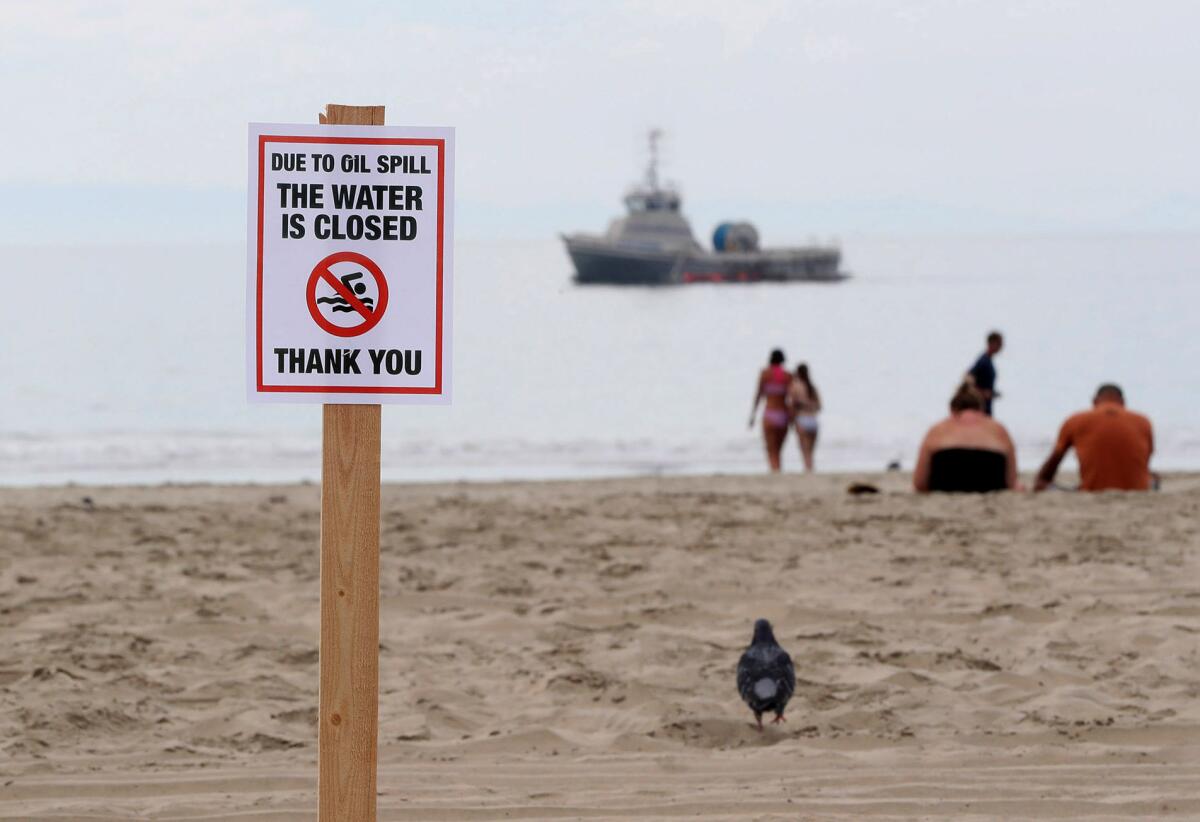
While no new marine mammals had been brought to the center since the oil spill as of Tuesday, Higuchi said the true fallout of the disaster will not be known for some time.
“The impact to these marine mammals can last short term and long term,” she added. “There can be forever changes to our environment and ecosystem in areas, so we don’t fully know the magnitude of this spill quite yet.”
In the environmentally conscious enclave of Laguna Beach, community support has been overwhelming in the immediate aftermath of the oil spill, Higuchi said.
As if on cue, Cherie Polo of Dana Point stopped by Tuesday to donate several bottles of soap and trash bags, two items on PMMC’s wish list. She described the awfulness of watching the weekend’s events unfold.
“I think it’s awful,” said Polo, an avid whale watcher. “And it’s not just this oil spill — there’s trash in our ocean. It’s us humans that are destroying our beautiful planet. We all, as humans, can be more responsible.”
Higuchi said the center has been collecting donated items on site, in part, to prevent well-intentioned citizens from disrupting cleanup efforts and for their own health.
“We definitely do not want [items] dropped off at the front line,” she said. “It’s all hands on deck, and it’s a dangerous area out there with all the toxins and chemicals.”
Teams of clean-up crews fan out
In Newport Beach Tuesday, cleanup crews wearing in boots lined with yellow plastic patrolled the shoreline well into the late afternoon, carrying shovels and bags to contain the toxic materials. City spokesman John Pope confirmed 37 workers were stationed in west Newport, where the highest concentration of oil deposits was observed, while eight were deployed to the Wedge and 17 were transported to Corona del Mar.
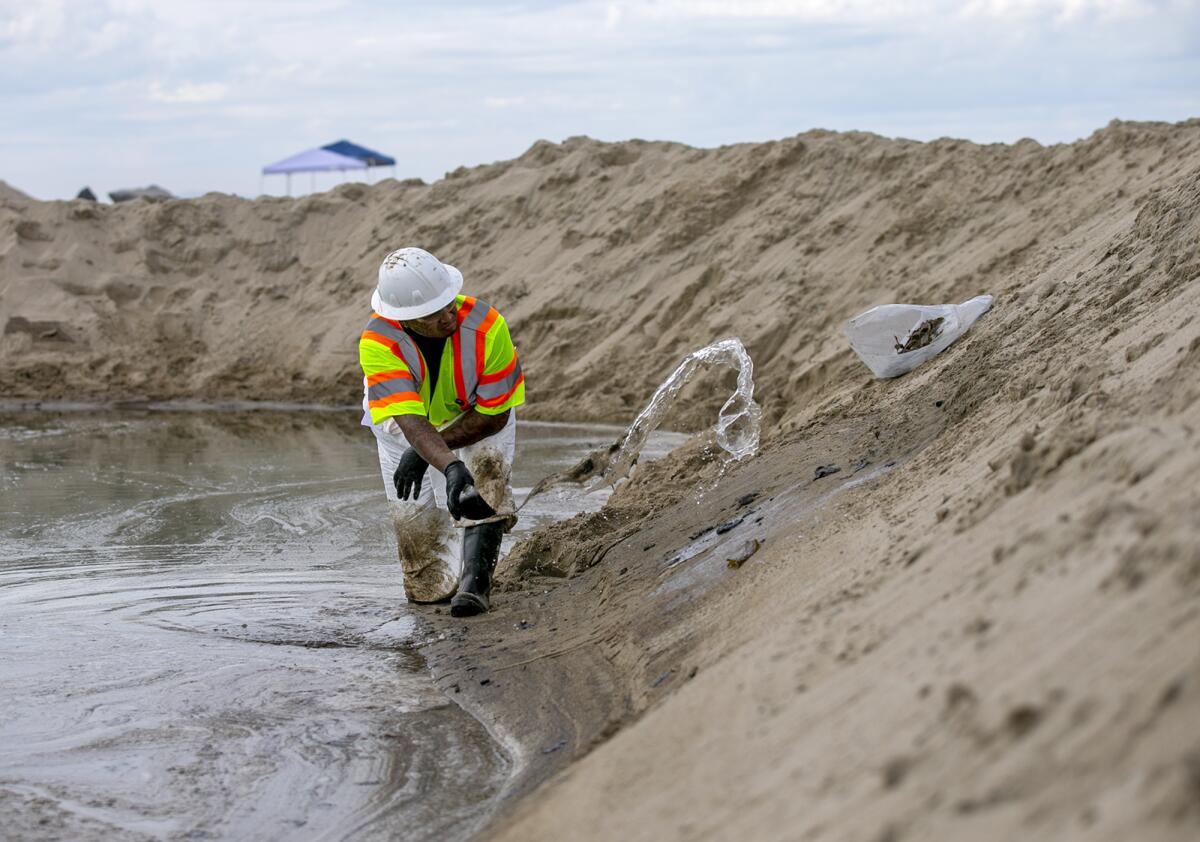
Similar efforts were underway in Laguna Beach, where Chief of Marine Safety Kevin Snow reported city officials were working with the U.S. Coast Guard through the operation division of the recently established Incident Command Post. Two oil recovery vessels have been working since Monday to keep more oil from coming ashore.
Laguna Beach is a Marine Protected area, so it is critical we get resources in here to help with cleanup efforts,” Snow said.
Orange County Supervisor Katrina Foley, whose Second District includes Huntington Beach and Newport Beach, took a helicopter tour of the coastline earlier this week with the Orange County Sheriff’s Department and Rep. Mike Levin (D-San Juan Capistrano).
Foley said there didn’t appear to be as much encroachment into the shoreline as had been previously seen. Newport Beach and Dana Point harbors are both closed, though Foley mentioned that people can use the Huntington Beach and Long Beach harbors for their boating needs.
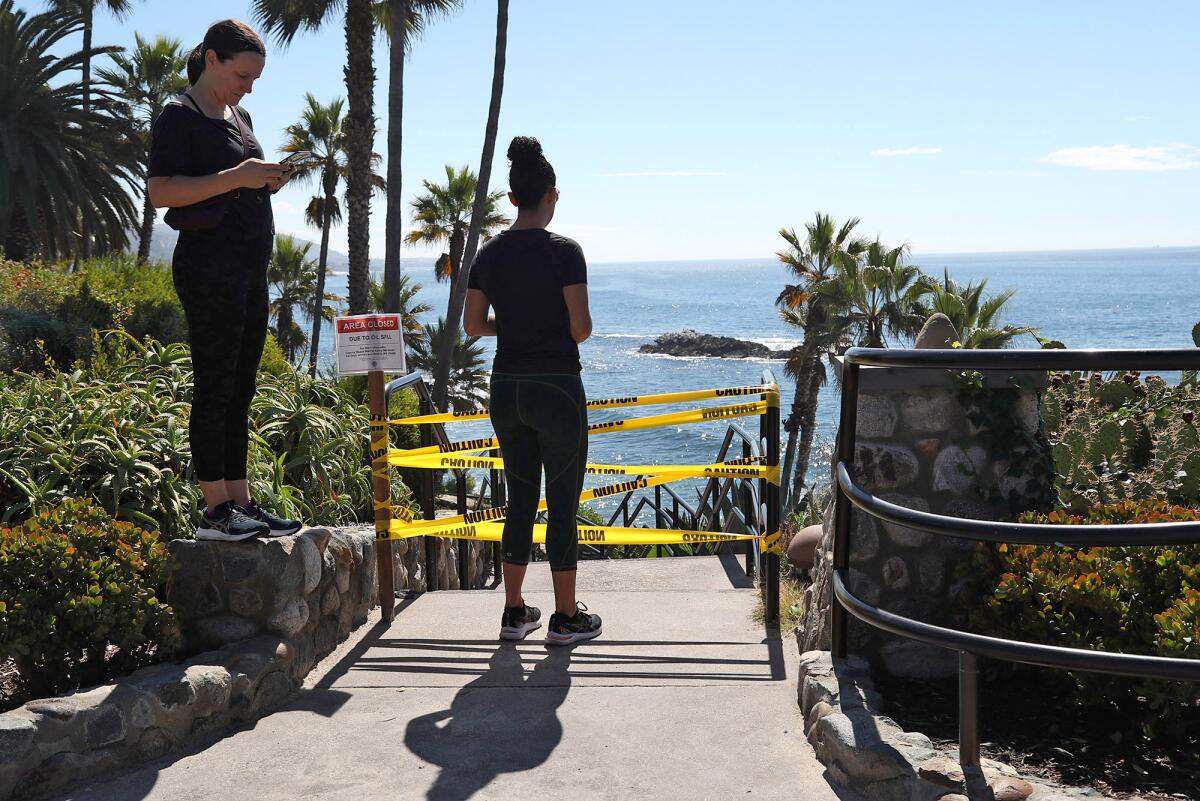
“It’s traveling south into other areas,” she said. “They’re looking at how much further south it’s going to get, seemingly maybe even to the Mexican border. We are still going to keep monitoring it.”
Foley said there remains no timeline for when the beaches, now closed throughout Orange County, will reopen and cleanup will be done.
“I felt positive about the fact that the oil is not rushing toward the shore. You didn’t see big clumps of oil near the shore. It was mostly big ribbons and threads that looked like they were almost two miles out … moving not toward the shore, but parallel or away,” she said. “As the ocean moves, so goes the oil.”
California Department of Fish & Wildlife has set up an Oiled Wildlife Care Network hotline at (877) 823-6926 for individuals who may see wildlife impacted by the spill.
Individuals interested in future cleanup efforts are encouraged to visit the Wetlands Wildlife Care Center at wwccoc.org or the Surfrider Foundation at cleanups.surfrider.org.
All the latest on Orange County from Orange County.
Get our free TimesOC newsletter.
You may occasionally receive promotional content from the Daily Pilot.







